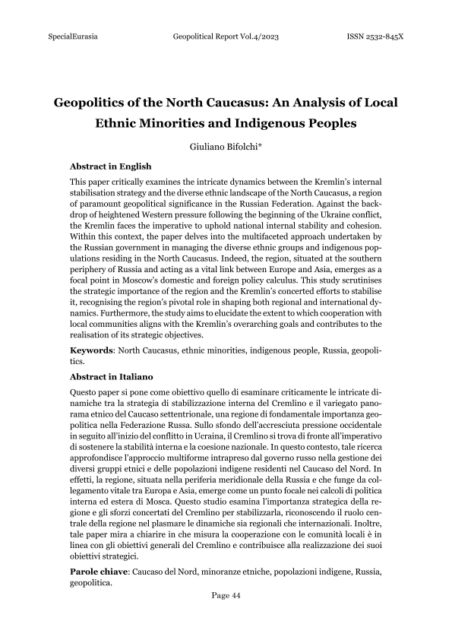
Title: Geopolitics of the North Caucasus: An Analysis of Local Ethnic Minorities and Indigenous Peoples
Publication: Geopolitical Report ISSN 2532-845X
Authors: Giuliano Bifolchi
Citation: Giuliano Bifolchi, “Geopolitics of the North Caucasus: An Analysis of Local Ethnic Minorities and Indigenous Peoples”, Geopolitical Report ISSN 2532-845X, Vol.4, 2023, pp. 44-53.
Abstract in English
This paper critically examines the intricate dynamics between the Kremlin’s internal stabilisation strategy and the diverse ethnic landscape of the North Caucasus, a region of paramount geopolitical significance in the Russian Federation. Against the backdrop of heightened Western pressure following the beginning of the Ukraine conflict, the Kremlin faces the imperative to uphold national internal stability and cohesion. Within this context, the paper delves into the multifaceted approach undertaken by the Russian government in managing the diverse ethnic groups and indigenous populations residing in the North Caucasus. Indeed, the region, situated at the southern periphery of Russia and acting as a vital link between Europe and Asia, emerges as a focal point in Moscow’s domestic and foreign policy calculus. This study scrutinises the strategic importance of the region and the Kremlin’s concerted efforts to stabilise it, recognising the region’s pivotal role in shaping both regional and international dynamics. Furthermore, the study aims to elucidate the extent to which cooperation with local communities aligns with the Kremlin’s overarching goals and contributes to the realisation of its strategic objectives.
Keywords: North Caucasus, ethnic minorities, indigenous people, Russia, geopolitics.
Abstract in Italiano
Questo paper si pone come obiettivo quello di esaminare criticamente le intricate dinamiche tra la strategia di stabilizzazione interna del Cremlino e il variegato panorama etnico del Caucaso settentrionale, una regione di fondamentale importanza geopolitica nella Federazione Russa. Sullo sfondo dell’accresciuta pressione occidentale in seguito all’inizio del conflitto in Ucraina, il Cremlino si trova di fronte all’imperativo di sostenere la stabilità interna e la coesione nazionale. In questo contesto, tale ricerca approfondisce l’approccio multiforme intrapreso dal governo russo nella gestione dei diversi gruppi etnici e delle popolazioni indigene residenti nel Caucaso del Nord. In effetti, la regione, situata nella periferia meridionale della Russia e che funge da collegamento vitale tra Europa e Asia, emerge come un punto focale nei calcoli di politica interna ed estera di Mosca. Questo studio esamina l’importanza strategica della regione e gli sforzi concertati del Cremlino per stabilizzarla, riconoscendo il ruolo centrale della regione nel plasmare le dinamiche sia regionali che internazionali. Inoltre, tale paper mira a chiarire in che misura la cooperazione con le comunità locali è in linea con gli obiettivi generali del Cremlino e contribuisce alla realizzazione dei suoi obiettivi strategici.
Parole chiave: Caucaso del Nord, minoranze etniche, popolazioni indigene, Russia, geopolitica.
Author Bio
Giuliano Bifolchi is the SpecialEurasia Research Manager. He has vast experience in Intelligence analysis, geopolitics, security, conflict management, and ethnic minorities. He holds a PhD in Islamic history from the University of Rome Tor Vergata, a master’s degree in Peacebuilding Management and International Relations from Pontifical University San Bonaventura, and a master’s degree in History from the University of Rome Tor Vergata. Currently, he is also a professor in Webint and Open Source Intelligence at the European Forensic Institute of Malta. Previously, he founded and directed ASRIE Analytica. He has written several academic papers on geopolitics, conflicts, and jihadist propaganda. He is the author of the books “Geopolitica del Caucaso russo. Gli interessi del Cremlino e degli attori stranieri nelle dinamiche locali nordcaucasiche” (Sandro Teti Editore 2020) and “Storia del Caucaso del Nord tra presenza russa, Islam e terrorismo” (Anteo Edizioni 2022). He was also the co-author of the book “Conflitto in Ucraina: rischio geopolitico, propaganda jihadista e minaccia per l’Europa” (Enigma Edizioni).



